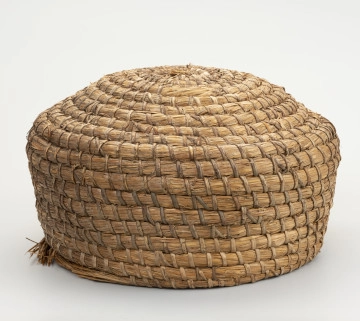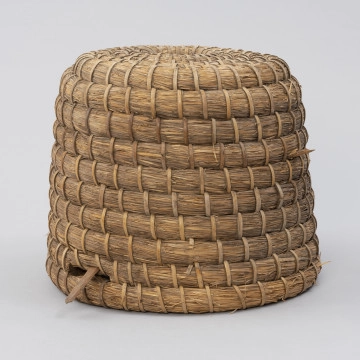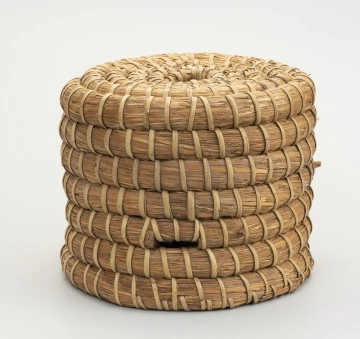
Skep (dome beehive)
1965
National Museum in Szczecin
Part of the collection: Beekeeping
Due to its nutritional properties and excellent flavour, honey has been harvested for a long time. Initially, honey was poached from wild bees, over time beekeeping - the craft of breeding bees - developed from this primitive apiculture. In their work, beekeepers used tools specific to their trade. Among which was the bee smoker, a device composed of a cylindrical body with a nozzle and a bellows, used to calm the bees. The bee smoker was used during the honey harvest and for other work in the hives. Its operating principle was simple: a container inside the body was filled with fuel, such as tree punk, which when ignited and extinguished produced embers. The embers were kept burning by air being pumped into the device via a bellows, and the resulting smoke was discharged through a chimney opening at the front of the body. The beekeeper would point it to his desired location. The fumigated bees would calm down and move up the hive, and the beekeeper could safely perform his work. The industrially manufactured bee smokers of today differ little from the item featured in the ethnographic collection of the National Museum in Szczecin, which was produced using traditional craft methods. Both in the past and present, these have been essential pieces of apiary gear. Agnieszka Słowińska
Author / creator
Object type
bee smoker
Technique
artisanal techniques, bending, riveting, saddlery techniques
Material
leather, wood, metal
Origin / acquisition method
donation
Creation time / dating
Creation / finding place
Owner
Muzeum Narodowe w Szczecinie
Identification number
Location / status

unknown
1965
National Museum in Szczecin

unknown
1890 — 1910
National Museum in Szczecin

unknown
1901 — 1920
National Museum in Szczecin
DISCOVER this TOPIC
National Museum in Lublin
DISCOVER this PATH
Educational path
0/500

We use cookies to make it easier for you to use our website and for statistical purposes. You can manage cookies by changing the settings of your web browser. More information in the Privacy Policy.
We use cookies to make it easier for you to use our website and for statistical purposes. You can manage cookies by changing the settings of your web browser. More information in the Privacy Policy.
Manage cookies:
This type of cookies is necessary for the website to function. You can change your browser settings to block them, but then the website will not work properly.
WYMAGANE
They are used to measure user engagement and generate statistics about the website to better understand how it is used. If you block this type of cookies, we will not be able to collect information about the use of the website and we will not be able to monitor its performance.